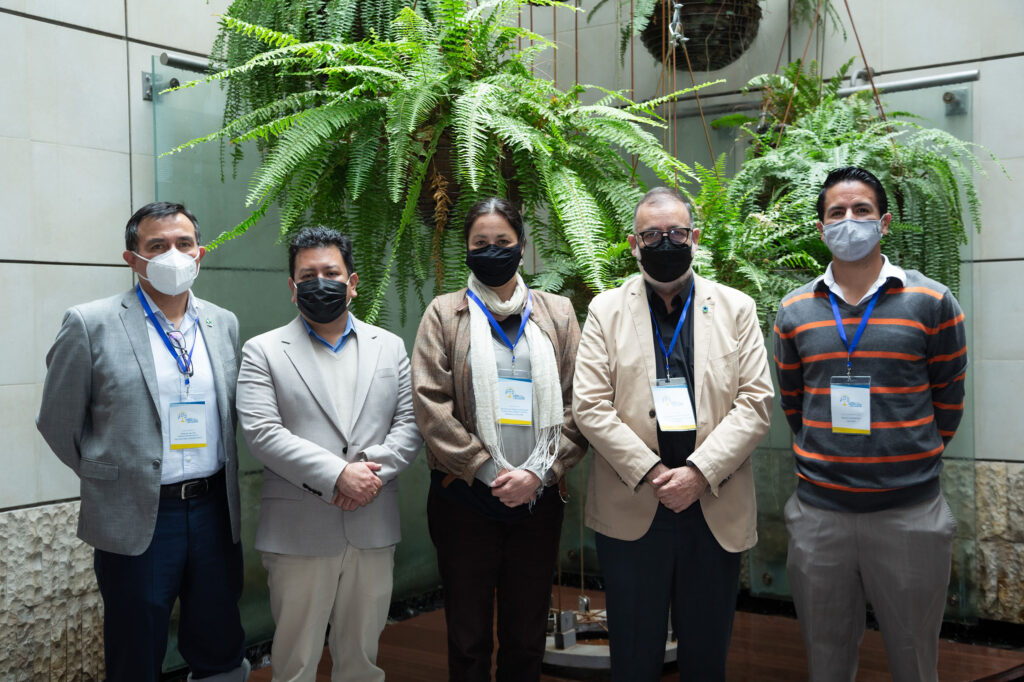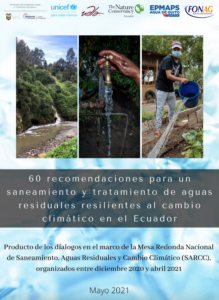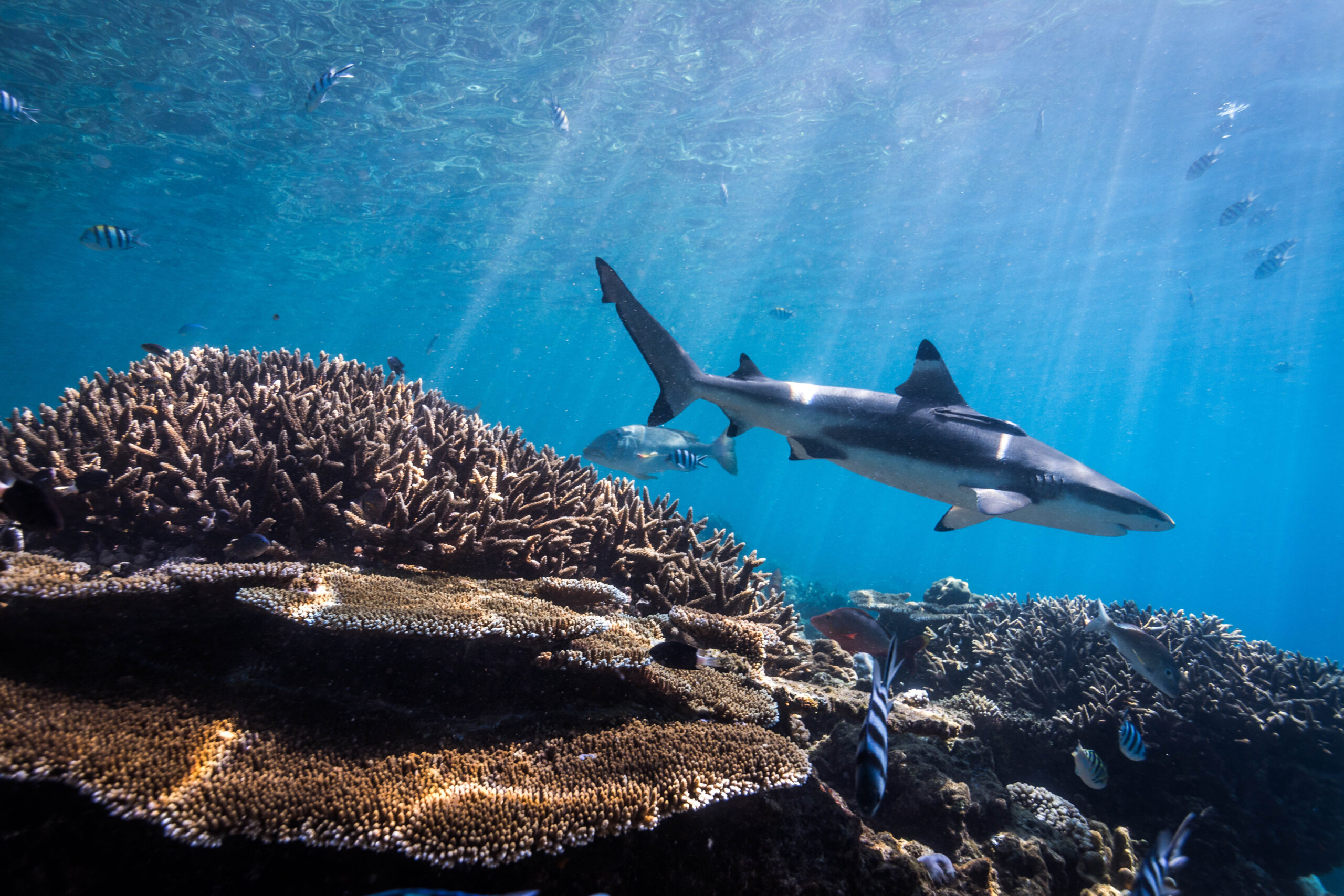Coalition to Promote Wastewater Policy in Ecuador
Location
Ecuador
The challenge
In Ecuador, 13.4 percent of the rural population does not have access to basic sanitation, and for the poorest populations throughout the country (both rural and urban), 23.5 percent lack access to sanitation. Additionally, 38.1 percent of municipalities in Ecuador do not have infrastructure for treating their wastewater. Most of the contaminated water goes directly into rivers, streams, or the ocean, which impacts ecosystems and public health. Wastewater contains several pollutants that can harm coral reefs, including sediment, nutrients, pesticides, trace metals, hydrocarbons, microplastics, and pharmaceuticals. Wastewater pollution can reduce the resilience of reefs and make them more sensitive to increased ocean temperatures, acidification, and other impacts from climate change.
In Latin America overall, wastewater treatment is almost nonexistent; 80 percent of wastewater is deposited directly into rivers and oceans. At least three out of five children suffer from malnutrition because of water-borne diseases. Globally, improving sanitation and access to clean water could prevent the deaths of nearly 2.2 million children per year.
Actions taken
In 2019, The Nature Conservancy (TNC) Ecuador became interested in how it could use water funds to implement wastewater treatment mechanisms. Water funds are organizations that design and enhance financial and governance mechanisms that unite public, private, and civil society stakeholders to contribute to water security through nature-based solutions and sustainable watershed management. To scale up the impact of water funds for wastewater treatment in Ecuador, TNC partnered with the United Nations International Children’s Emergency Fund (UNICEF) to develop a multidisciplinary approach to wastewater treatment and water conservation that addressed both environmental issues and public health, with a focus on children’s health.
Building off its partnership with UNICEF and work on water funds, TNC, UNICEF, Universidad de las Américas (UDLA), and other universities from the area came together to address the interconnected issues in Ecuador surrounding clean water, wastewater treatment and public health, and climate change. These partners, along with the Latin American Alliance of Water Funds, created the National Round Table of Sanitation, Wastewater, and Climate Change (SARCC). The SARCC is part of the Ecuador Water Security Coalition, which brings together private, academic, and civil stakeholders to contribute to public policy, science, conservation, corporate best practices, and communication to improve wastewater management. TNC, UNICEF, and UDLA led the SARCC to raise awareness of the direct link between human health and water quality and security. The SARCC promoted a national agenda for Ecuador in favor of universal access to sustainable and resilient solutions for sanitation and wastewater treatment, especially in the face of climate change.
Between December 2020 and April 2021, the SARCC coordinated four strategic workshops focused on different topics (see box) and sought to engage government, academic, private sector, and civil society stakeholders. The workshops analyzed national and local challenges related to each topic and used the identified challenges to help participants generate proposals for resilient and sustainable wastewater treatment and sanitation management strategies and actions. Workshop participants compiled ideas and recommendations into a draft document with the intention of sharing the final product with Ecuador’s Ministry of Environment and Water.

SARCC members. Photo © Maria Cristina De La Paz/TNC
How successful has it been?
Through the four workshops, the SARCC created a document with 60 recommendations for Ecuador’s Ministry of Environment and Water. The recommendations fall under seven themes: financing; capacity building; public participation; monitoring, regulation, control, and surveillance; regulations and implementation; technological alternatives; and prioritization of water sanitation in the political agenda and national and local institutions. The recommendations emphasize the important link between improving water quality and public health.

60 Recommendations for sanitation, wastewater treatment, and climate change resilience in Ecuador Photo © Maria Cristina De La Paz/TNC
The SARCC developed a webpage, the Biblioteca de Agua, that contains detailed information on the workshop activities; the 60 recommendations; and a database of publications, laws, ongoing projects, videos, and initiatives related to wastewater treatment in Ecuador.
The 60 recommendations from the SARCC have been well received by the Ecuadorian government—they have been instrumental in supporting the steps the government is taking toward improving water quality and public health. Based on the SARCC’s recommendations, the government is currently looking to support initiatives around wastewater treatment and conservation of water resources in Ecuador. They have also set priorities to fight against malnutrition in children through improving water quality and access to clean water. TNC and the SARCC continue to leverage joint efforts with the health sector to improve watershed and wastewater management for rural communities.
Lessons learned and recommendations
- Ensure all relevant parties are given a seat at the table. When holding a workshop such as this one, having all relevant stakeholder groups involved in planning discussions is extremely important. This workshop brought together the public, private, and civil sectors and representatives from academia. While coordinating among these groups can be logistically challenging, having cross-sectoral representation provides a comprehensive understanding of the issues at hand and how to address them.
- Share as much information with the public and partners as possible. One output from the SARCC was the Biblioteca de Agua, which hosts information related to the SARCC as well as resources from a number of different organizations about wastewater treatment, public health and wastewater pollution, connections between wastewater and climate change, and other topics. Having a centralized platform is a valuable tool for sharing the recommendations from the SARCC.
Lead organization
The Nature Conservancy Ecuador
Partners
UNICEF
UDLA
Latin American Alliance of Water Funds (Inter-American Development Bank, FEMSA Foundation, the Global Environment Facility, and the International Climate Protection Initiative)


